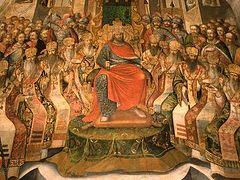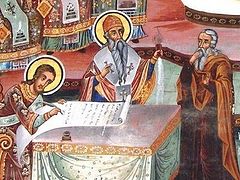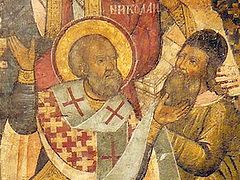 The First Council of Nicea, wall painting at the church of Stavropoleos, Bucharest, Romania. Photo: Wikipedia
The First Council of Nicea, wall painting at the church of Stavropoleos, Bucharest, Romania. Photo: Wikipedia The Council of Nicea ended a long time ago (in 325) and Arius is very, very dead. Why do we still make such a big deal about the Council and commemorate it at such an important time—i.e. right after Pascha and before Pentecost? There are no more Arians threatening our Orthodoxy. Admittedly the Jehovah’s Witnesses are still knocking on doors and being generally annoying, and the refined Unitarians are still working for Greenpeace, and the Christadelphians still lurk about as a kind of “J.W. lite”—like lite beer: all the taste but half the calories. In the same way they have all the heresy, but are half as annoying. At least they don’t knock on doors. But none of these Arian groups offer any threat to our Orthodox Christology. Why still celebrate Nicea with such liturgical fanfare? There are three reasons why.
First of all, Nicea reveals the conciliar nature of the Church. This conciliar nature follows directly from the Church being the Body of Christ. That is, Christ promised to manifest His saving presence when His disciples gathered in His name, even if it was a mere two or three of them (Matthew 18:20), and so this gathering [Greek ekklesia] functioned as the body through which He lived and expressed Himself. Note: it was through the body as a whole that He expressed himself, not just through the leader of the body or the holiest person there or the tallest or richest. So it was natural for the Church to gather as a body when it sought Christ and His wisdom to solve their problems and discern the truth. It worked like this: when there was a problem, the pastors of a given area (i.e. the local bishops) would gather together and talk and reach a consensus which was later endorsed (or not) by their flocks. In this way the entire Church would reach a consensus and obtain the truth. Everyone was ultimately involved in the decision- making; all members of the Family of God were responsible for discerning the truth. This was the conciliar model.
They could have used other models. The Roman Catholic model relies more upon a central seat of authority and the opinion of one leader (i.e. the Pope). Bishops still talk and consult, but at the end of the day, the Pope still gets to say what goes down. The Roman Catholic model is less like a family and more like a kingdom, with the King ruling his subjects. The Evangelical Protestant model is less like a family too, and more like a mob: in this model, each individual person decides for himself what he wants to believe, and then goes home. No consensus is really required. If the Roman Catholic model has the advantage of centralized efficiency of operation, this model has the advantage of ease and speed. It takes no time at all to ignore the issue as a church and make up one’s own mind as an individual.
The point is that this ecclesial conciliarity is meant to work on the local parish level as well. The parish is not a kingdom ruled by a king (or a pastor). And it is not a mob, where the people come and go as they please. It is a family, with a head (the pastor) and the other family members. And all work together in the family and contribute their own voice as they strive to reach a consensus and live together in love. And like a family, they are meant to stick together. Our personal identity in Christ does not just come from being Orthodox, as if we were “Orthodox at large” or Orthodox lone rangers. It also comes from being part of a specific local Orthodox parish. We don’t just belong to “the Orthodox Church” in general, for no one lives their life “in general”. We all live specific lives, and so we belong to a specific Orthodox church, like “Holy Trinity Orthodox Church” or “St. Nicholas Orthodox Church” or even “St. Herman’s Orthodox Church”. We belong to an Orthodox family and family is local by definition.
Secondly, Nicea proclaims that it is all about Jesus. In the Arian vision of things (or in the liberal Protestant vision of things), Jesus is the star of the show. But Nicea reveals that Jesus is not the star of the show. He isthe show. Salvation therefore consists of giving one’s life totally to Him—every moment of every hour, every breath that we draw into lungs, every drop of blood pulsing through in our veins—it all belongs to Him. Of course of self-oblation and devotion of that kind properly belongs only to God. If Jesus were not God but only some sacred celebrity, it would not be proper to give Him that kind of worship and dedication. Celebrities can demand at best only our loving admiration. If Jesus were not God, giving Him that degree of dedication would be idolatrous. That is why Nicea was necessary: it had to make clear that Jesus was God, and that we are justified in giving Him that degree of dedication. If we have Jesus, we have everything. If we lose Jesus, we lose everything. According to Nicea, ultimately nothing else matters but Him.
Thirdly, Nicea reveals that the Church is exclusionary. That is not because the Church is mean, but because truth is exclusionary by nature. If truth says that 2+2=4, then it excludes the opinion that 2+2=5. Sincerely holding the opinion that 2+2=5 will not suffice even if you are tremendously nice, and the truth will still exclude that opinion as false. Of course today to be exclusionary is considered as practically the worst of all vices, because the queen of all virtues, Niceness, demands that no one be excluded if it will make them feel bad. So, no one must be excluded, and Inclusivity takes its place as the crowning characteristic of civilized man. In this environment, the Church cannot but appear in a bad light, and its exclusionary nature deemed its major fault. But all healthy living things are exclusionary to some degree. A healthy body will exclude disease, and the mechanism by which it does this is called an “auto-immune system”. It refuses to be so inclusive as to include disease within it, because it wants to live. It is the same with the Church. It also has an auto-immune system which excludes spiritual disease, and this auto-immune system is called “Holy Tradition”. It says, for example, that confessing the divinity of Jesus is right, and denying the divinity of Jesus is wrong. And since, as we have seen, being wrong about the divinity of Jesus is not just error about an insignificant detail (like being wrong on the question of who wrote the Epistle to the Hebrews), but being wrong about the question of where true life can be found, the Church insists on excluding this error. Facts are stubborn things, and since the Church has been given facts about salvation, it too has to be very stubborn at times.
Nicea is commemorated every year right after Pascha. But it is too important to be commemorated only then. In a sense we commemorate Nicea every time we say the Creed—i.e. at least every Sunday. For the Creed is not simply one item in the Liturgy, one piece of furniture within the ecclesiastical house. It constitutes the very walls of that house. Take down the walls, and the house comes crashing down. To preserve all the furniture within the house, the walls must continue to stand. And to preserve the saving realities within the Church, the Creed must continue to stand as well. And that is worth at least a glorious commemoration once a year.




